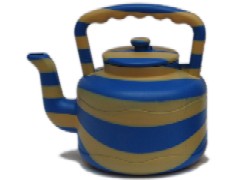The West African recycled plastic kettle is found across that part of Africa. Unless you have been to West Africa it is hard to understand its importance in the everyday lives of ordinary people. They are used for carrying water, filling pots and pans, washing hands and babies and yet have two more important functions.
Good muslims have to do ‘wudu’ (ritual washing before prayers) up to five times a day. It areas where tapped water is difficult to find, it is hard to undertake this washing using water from a public tap or well. The ritual cleansing also involves clearing the mind, which might be a challenge when squabbling for access to a tap. Hence the washing is made quieter and more efficient if done privately from water carried in one of these kettles.
The kettles also provide water for cleaning after using the toilet and in some households a full kettle outside the latrine means it is ready for use, no kettle means that the toilet is in use.
So the humdrum plastic made in their thousands in modern factories in Senegal, Ghana and Nigeria are an important adjunct to daily life and for people elsewhere this artefacts help to provide an insight into the daily lives of others.
